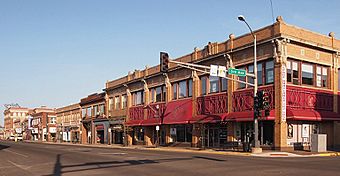East Howard Street Commercial Historic District facts for kids
Quick facts for kids |
|
|
East Howard Street Commercial Historic District
|
|

East Howard Street from 3rd Avenue looking southeast
|
|
| Location | 101–510 E. Howard Street, Hibbing, Minnesota |
|---|---|
| Area | 7 acres (2.8 ha) |
| Built | 1919–1925 |
| Built by | C.F. Haglin & Sons |
| Architect | Oliver Iron Mining Company |
| Architectural style | Colonial Revival, Prairie School, Tudor Revival |
| NRHP reference No. | 93000255 |
| Added to NRHP | April 1, 1993 |
The East Howard Street Commercial Historic District is a special area in Hibbing, Minnesota. It's a historic business district that covers both sides of East Howard Street for four blocks, from 1st to 5th Avenues. This district was built between 1920 and 1921 by the Oliver Iron Mining Company. They designed and constructed this new business area because the entire town of Hibbing had to move.
The city was moved about a mile south so that the company could make the huge Hull–Rust–Mahoning Open Pit Iron Mine even bigger. This historic district was added to the National Register of Historic Places in 1993. It was recognized for its importance in how communities are planned and developed. It shows how the Oliver Iron Mining Company worked to move the whole town. It also highlights how important iron mining was to the Mesabi Range area.
What Makes This District Special?
This historic district includes 34 important buildings. These buildings are called "contributing properties" because they help tell the story of the district's history. Two of these buildings, the Androy Hotel and the Delvic Building, are so important that they are also listed individually on the National Register of Historic Places.
Why Was Hibbing Moved?
Imagine having to move an entire town! That's what happened to Hibbing. The Oliver Iron Mining Company needed more space to expand their giant iron mine. Iron mining was a huge industry in this area. To get to more iron ore, they had to move the whole city out of the way. The East Howard Street Commercial Historic District was a big part of this planned move. It became the new downtown area for Hibbing.
Buildings and Their Styles
The buildings in the district were built between 1919 and 1925. They show different architectural styles popular at the time. You can see buildings with Colonial Revival architecture, Prairie School style, and even Tudor Revival architecture. These styles make the district unique and show how architecture changed over time.



